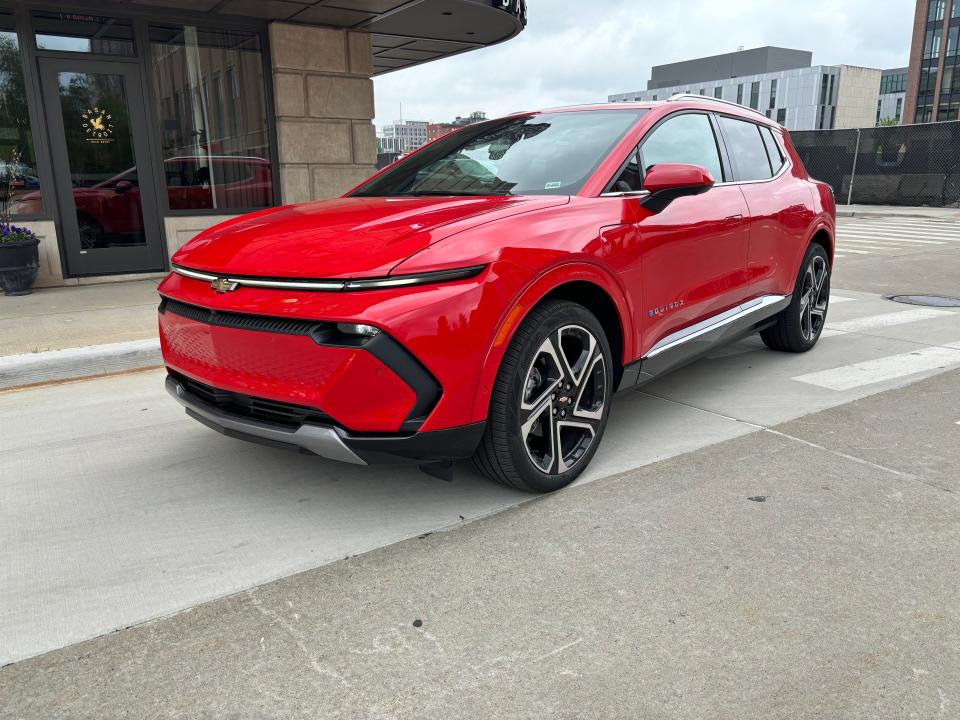GM reports $4.4 billion in Q2 pretax profits, increases expected earnings for full year
General Motors on Tuesday reported a 37% gain in its adjusted pretax income, to $4.4 billion, for the second quarter of 2024. The results are due to strong sales of gasoline-powered pickups and SUVs, improving sales of electric vehicles and stable pricing with low incentives, CEO Mary Barra said in a letter to shareholders.
GM said that, based on the strong results, it is increasing its guidance for full-year earnings. For the year, GM expects to report a pretax income of $13 billion to $15 billion, compared with earlier guidance of $12.5 billion to $14.5 billion.
The automaker also announced it is suspending production of the Cruise Origin, a self-driving buslike vehicle that had been assembled at Factory Zero in Detroit and Hamtramck until GM paused its production in November 2023.

Barra said GM's self-driving subsidiary Cruise will instead focus "their next autonomous vehicle on the next-generation Chevrolet Bolt, instead of the Origin. This addresses the regulatory uncertainty we faced with the Origin because of its unique design. In addition, per-unit costs will be much lower, which will help Cruise optimize its resources."
GM recorded a $600 million charge in stopping production of the Origin, CFO Paul Jacobson told reporters. While no decisions have been made yet as to where the Cruise version of the Bolt will be assembled, Jacobson said it will most likely be at the Fairfax Assembly plant in Kansas. GM has said it will build the upcoming new Chevrolet Bolt, which will use the Ultium propulsion system, at Fairfax.

Asked whether GM will revive the Origin at some point, Jacobson said, “we might, we might. The future has uncertainty to it. We’re really focused on the Bolt.”
Finally, Jacobson said GM will restructure its business in China after struggling to make significant profits there in recent years.
"We've been taking steps to reduce our inventories, align production to demand and reduce our fixed costs, but it's clear that the steps that we've taken, while significant, have not been enough," Jacobson said. "We're working closely with our (joint venture) partners to restructure the business to make it profitable and sustainable while ensuring that it doesn't require incremental capital."
GM's Q2 results
For the quarter, GM said its total revenue rose 7.2% to $48 billion. GM's net income rose 14.3% to $2.9 billion from $2.6 billion in the year-ago quarter.
Barra told shareholders that "better execution" will continue to benefit GM as it launches eight new or redesigned compact, midsize and full-size gasoline-powered SUVs in North America this year, all of which will have higher profit margins than the models they replace. For the quarter, GM reported a gain of 0.6% to 696,086 vehicles sold, its best quarter for total sales since the fourth quarter of 2020. It delivered nearly 22,000 EVs in the second quarter.
"To unleash the next cycle of EV growth, we’re scaling production of the Chevrolet Equinox EV, with its unique combination of performance, technology, range and affordability," Barra wrote.
Jacobson said production of the Equinox EV, which is made in the Ramos Arizpe Assembly plant in Mexico, has been increased so that GM can get the vehicles in front of customers faster. GM will launch the following new EVs later this year: GMC Sierra EV pickup, Cadillac Optiq, Cadillac Escalade IQ and handbuilt Cadillac Celestiq.

Jacobson said GM will spend about $400 million more on marketing in the second half of the year compared with the first half to launch the new vehicles coming to market, but said that is still lower than GM's past marketing spending as the company continues to watch costs. GM does not disclose its marketing budget.
"As excited as we are about our EVs and our early success, we are committed to disciplined volume growth, which is the key to earning positive variable profits from our portfolio in the fourth quarter, which remains our goal," Barra said.
Variable profit is when the revenue GM earns from selling the vehicle exceeds the direct cost of producing it. The calculation excludes corporate and fixed costs.
In China, which is already adopting EVs at a rapid rate, GM continues to face challenges, reporting a loss of $104 million in the quarter compared with a gain of $78 million a year earlier.
GM's credit arm, GM Financial, reported a gain of $822 million in adjusted pretax profits compared with $766 million a year ago.
First half results
For the first half of the year, GM reported an 18% rise in pretax adjusted income to $8.3 billion. GM's net income to shareholders rose 19.2% to $6 billion. Its total revenue was up 7.4% to $91 billion.
Net income attributable to shareholders soared 19.2% to $6 billion. GM Financial adjusted pretax income was up 1.4% to $1.6 billion.
GM China equity income showed a loss of $210 million compared with a gain of $161 million in the year-ago period.
Overall, Wall Street reacted positively to the results as GM's stock price Tuesday around 8:15 a.m. rose 1.26% to $49.56. GM stock closed the day at $46.38.
"We believe the long-awaited turnaround for the GM story is now underway with stable pricing across its portfolio while focusing more on margins and capital efficiency and Barra & Co. driving this renaissance of growth into (the second half and 2025)," Dan Ives, managing director and senior equity analyst at Wedbush Securities, told the Free Press in an email. "Importantly, GM said it will pause production of its Cruise Origin autonomous vehicle which will be a relief for investors and also come along with a $600 million charge for this troubled unit."
Morningstar auto analyst David Whiston told the Free Press that GM had a, "really good quarter on volume, pricing and cost-reduction contributions."
GM's pricing ahead
For the quarter, GM said its average transaction price was about $50,000 and its incentives were 1.5 percentage points below the industry average.
Jacobson said the automaker's prices have held up consistently, in part due to controlled incentives and the mix of trim level offerings. He said the average transaction price is down slightly from a year ago due to a change in GM's vehicle mix with more lower-priced Chevrolet Trax subcompact SUVs included, lowering the average transaction price. But "for full-size trucks and SUVs, the prices have held," he said.
For the second half, Jacobson said prices could come down 1% to 1.5%, but, ultimately, prices are driven by demand.
"We’re taking it month by month, quarter by quarter and making sure we put products in the market that our customers love," Jacobson said.
A possible change in plans to GM's Lansing battery plant?
In its joint venture with LG Energy Solution called Utlium Cells LLC, two battery cell plants are supplying GM's EVs at the moment: One near Lordstown, Ohio, and the other in Spring Hill, Tennessee. Ultium Cells is constructing a third plant in Lansing expected to create about 1,700 jobs after it starts operations, expected later this year.
Last year, GM selected a site in northern Indiana, near the Michigan border, to build a fourth battery cell plant. The new plant is a joint venture forged between GM and South Korea-based Samsung SDI. That plant is expected to open in 2026 and has been projected to create 1,700 jobs.
But in June, GM pulled back its targeted production of its new EVs this year from between 200,000 and 300,000 to between 200,000 and 250,000 due to slowing demand for EVs. Asked whether GM still plans to open those two plants on schedule or if one plant may be canceled due to the slowing EV adoption rate, Jacobson said GM is making good progress in its battery cell production and will be guided by the customer.
"When you look at some of the decisions we’ve made to put off some of the capital, defer some of the investments, et cetera, we’re going to continue to be guided by the customer," Jacobson said. "We're rapidly scaling in (battery) cell plants one and two. That's actually a huge component that's helping us achieve our variable profit positive as our cell costs continue to come down, and LG is a big part of that."
When asked again, directly whether either the Lansing plant or Indiana plant will be put on hold or canceled, Jacobson said, "At the end of the day, we have nothing to comment on right now. We are really focused on scaling up at Spring Hill and continuing to keep Lordstown operating very efficiently. We've been very pleased with the scale economies we’ve gotten there and we're looking to continue to grow the portfolio."
More: Future of Detroit 3 for EVs could hinge on 2024 presidential election, analysts say
More: GM stops assembly at Missouri truck plant after UAW strike at Lear seat factory
Contact Jamie L. LaReau: jlareau@freepress.com. Follow her on Twitter @jlareauan. Read more on General Motors and sign up for our autos newsletter. Become a subscriber.
This article originally appeared on Detroit Free Press: GM reports 37% gain in Q2 pretax profits